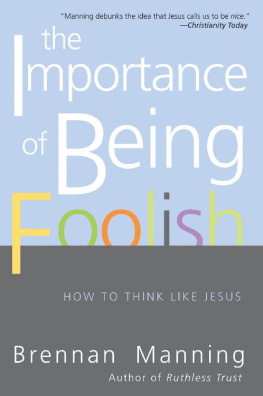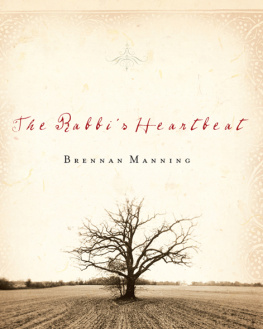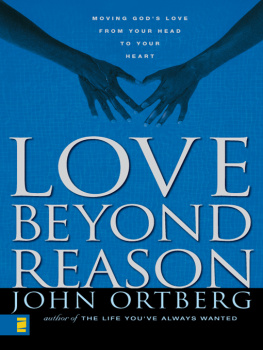A
GLIMPSE
OF
JESUS
The Stranger to Self-Hatred
BRENNAN MANNING

For Jack and Jan Carter, who demolished the myth that you cant be cool and Christian, whose unique Southern Baptist thinking is more catholic than mine, and whose hearts are like a bloodshot sunset.
TABLE OF CONTENTS
T his little book pretends to be no more than the title claims: a glimpse of Jesus. That is all I have. It was written for myself and anyone else who has been tyrannized by self-hatred. I envision a wide reading audience, because self-hatred is the predominant spiritual problem that Ive had to deal with in twenty-eight years as a vagabond evangelist.
Unhealthy guilt, shame, remorse, and self-hatred are no respecters of persons. Vague feelings of existential uneasiness before the Lord God transcend poverty and wealth, cultural and educational differences, distinctions between clergy and laity.
While A Glimpse of Jesus is polemical in places, and questions the vision of certain authority figures in the church, it never questions the personal integrity or the pastoral concern of their ministries. Blaming the church is a jejune, counterproductive defense mechanism for which I have neither the time nor the heart. The church has been and will remain the locus of my encounter with Jesus Christ. One of the several purposes within these pages is to contribute to the raising of community consciousness at the grassroots level. A fearless reexamination of pastoral values, attitudes, and practices is part of the ongoing task of perennial reform.
The sweeping implications of the social dimension of the gospel, so vital for Christian renewal, are left largely untreated here because of the limited scope of the subject. A glimpse is a glimpse and nothing more. And nothing less either.
Perhaps what is decisive is not how much we see, but how much we trust and follow Jesus of Nazareth, however sketchy the portrait, however partial the glimpse.
R epetitio est mater studiorum, goes the old Latin proverb. Since repetition is the mother of study, I begin this book with a story previously cited in my 1994 work, Abbas Child.
If repression was the predominant defense mechanism of the past century, projection takes pride of place today. And so we turn to Flannery OConnors short story The Turkey. The anti-hero and principal protagonist is a little boy named Ruller. He has a poor self-image because nothing he turns his hand to ever seems to work.
One night in bed Ruller overhears his parents analyzing him. Rullers an unusual one, his father says. Why does he always play by himself? His mother answers, How am I to know?
One day in the woods Ruller spots a wild and wounded turkey and sets off in hot pursuit. Oh, if only I can catch it, he cries. He will catch it, even if he has to run it out of state. He sees himself triumphantly marching through the front door of his house with the turkey slung over his shoulder and the whole family screaming, Look at Ruller with that wild turkey! Ruller, where did you get that turkey?
Oh, I caught it in the woods. Maybe you would like me to catch you one sometime.
But then a troubling thought flashes across his mind: God will probably make me chase that damn turkey all afternoon for nothing. Hmmn, shouldnt think that way about God though; yet that was the way he felt. If that was the way he felt, could he help it? He wondered if he was unusual.
Ruller finally captures the turkey when it rolls over dead from a previous gunshot wound. He hoists it on his shoulders and begins his messianic march back through the center of town. He remembers the things he had thought before he got the bird. They were pretty bad, he guesses. He figures God had stopped him before it was too late. He should be very thankful.
Thank you, God, he says. Much obliged to you. This turkey must weigh ten pounds. You were mighty generous.
Maybe getting the turkey was a sign, he thinks. Maybe God wanted him to be a preacher. He thinks of Bing Crosby and Spencer Tracy.
Ruller enters town with the turkey slung over his shoulder. He wants to do something for God, but he doesnt know what to do. If anybody was playing the accordion on the street today, he would give that musician his dime. It was the only dime he had, but he would give it to them anyway.
Two men approach and whistle at the turkey. They yell at some other men on the corner to look. How much do you think it weighs? they ask.
At least ten pounds, Ruller answers.
How long did you chase it?
About an hour, says Ruller.
Thats really amazing. You must be very tired.
No, but I have to go, Ruller replies. Im in a hurry. He cant wait to get home.
He begins to wish that he would see somebody begging. Suddenly he prays, Lord, send me a beggar. Send me one before I get home. God had put the turkey there. Surely God will send him a beggar. He knows for a fact that God will send him one. God is interested in him because he is an unusual child.
Please, one right nowand the minute he says it, an old beggar woman heads straight at him. His heart is stomping up and down in his chest. As they near each other, Ruller springs at the woman, shouting, Here, here, thrusts the dime into her hand, and dashes on without looking back.
Slowly his heart calms and he begins to feel full of a new feelinglike being happy and embarrassed at the same time. Maybe, he thinks, he will give all his money to her. He feels as if the ground doesnt need to be under him any longer.
Ruller notices a group of country boys shuffling behind him. He turns round and asks generously, Yall wanna see this turkey?
They stare at him. Where did ya git that turkey?
I found it in the woods. I chased it dead. See, its been shot under the wing.
Lemme see it, one boy says. Ruller hands him the turkey. The turkeys head flies into Rullers face as the country boy slings it up in the air and over his own shoulder and turns. The others turn with him and saunter away.
They are a quarter-mile away before Ruller moves. Finally he realizes that he cant even see the boys anymore, they were so far away. Then he turns toward home, almost creeping.
He walks for a bit and then, noticing it is dark, suddenly begins to run. OConnors exquisite tale ends with the words: He ran faster and faster, and as he turned up the road to his house, his heart was running as fast as his legs and he was certain that Something Awful was tearing behind him with its arms rigid and its fingers ready to clutch.
The story hardly needs any commentary, for in little Ruller many of us Christians stand revealed, naked, exposed. Our God is the One who benevolently gives turkeys and then capriciously takes them away. When he gives them, they are a sign of his interest, favor, and good pleasure with us. We feel comfortably close to God and are spurred to the heights of generosity. When he takes them away, it is a sign of his displeasure, rejection, and vengeance. We feel cast off by God. He is fickle, unpredictable, and whimsical. He builds us up only to let us down. He relentlessly remembers our past sins and vindictively retaliates by snatching the turkeys of good health, wealth, inner peace, empire, success, and joy.
PROJECTIONISM
The script for self-hatred starts with this distorted view of God. As mathematician/philosopher Blaise Pascal wrote, The mechanism of projection is a process of unwittingly ascribing to God our own attitudes and feelings as an unconscious defense of our own inadequacy or guilt.
Next page








